Liège-Bastogne-Liège 2024: Route, contenders, and prediction
Can anyone stop the favourites from making La Doyenne a two-horse race?
Of almost all the Classics so far this season this week’s Flèche Wallonne stood out for more than just its apocalyptic conditions. It was a rare moment in which pre-race predictions were not dominated by one of men’s cycling's seemingly unbeatable talents, and ended up providing one of the most unpredictable Classics so far.
That being said, the Amstel Gold Race last Sunday likewise did not follow the playbook despite the presence of a certain Mathieu van der Poel. It begs the question, then, whether Sunday’s Liège-Bastogne-Liège will follow in the footsteps of its Ardennes Classic cousins, or follow expectations as a showdown between Van der Poel and the returning Tadej Pogačar.
Either way, the 175 who start the race will almost certainly face one of the most difficult days of the season whatever the weather, thanks to the sheer length of La Doyenne and the relentless climbing that defines the second half of the course.
The start list is not quite as formidable as it may have looked a month ago with defending champion Remco Evenepoel and former winner Primož Roglič missing after crashing at Itzulia Basque Country, but there are still a number of in-form riders heading to Liège that could provide a challenge to Pogačar and Van der Poel.
Liège-Bastogne-Liège 2024 route
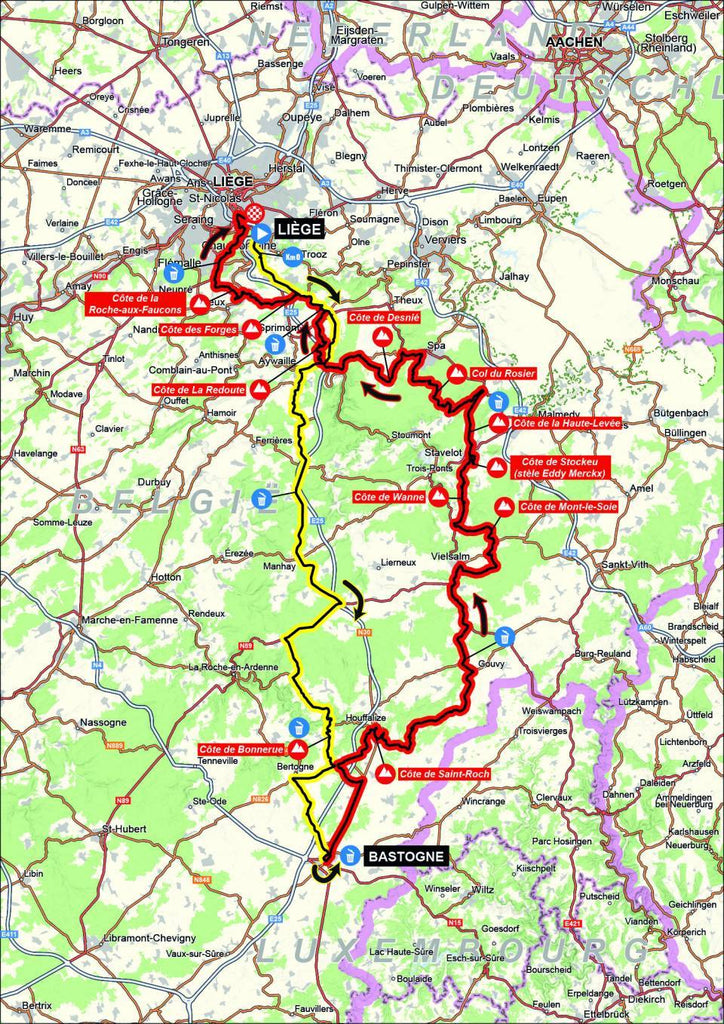 At 254.5km, the season’s fourth Monument is still an extensive day out for the peloton as it makes its way from Liège to Bastogne and back again. The first 95.5km to Bastogne is the ‘easier’ part of the race with just one categorised climb, but that is this race’s trap. While the 11 named climbs understandably draw the most attention, the Ardennes Forest is defined by its almost never ending sequence of rolling hills, many unclassified, which will begin to soften up the legs of the peloton before the official climbs even begin.
At 254.5km, the season’s fourth Monument is still an extensive day out for the peloton as it makes its way from Liège to Bastogne and back again. The first 95.5km to Bastogne is the ‘easier’ part of the race with just one categorised climb, but that is this race’s trap. While the 11 named climbs understandably draw the most attention, the Ardennes Forest is defined by its almost never ending sequence of rolling hills, many unclassified, which will begin to soften up the legs of the peloton before the official climbs even begin.
Nevertheless, the real climbing begins on the return leg to Liège; a circuitous route that cuts back and forth to ensure it can fit in as many ascents as possible. The first of these is the Côte de Saint-Roch at kilometre 117, a 900m climb with an almost 11% average gradient. There is then a more than 40km wait until the next named climb, the Côte de Mont-le-Soie, but that is followed by a peppering of three more climbs within the next 20km.
The end of this sequence is when we’ll likely see the teams of the main contenders begin to steadily up the pace of proceedings, perhaps closing down the gap of the bold but futile early breakaway. That’s because 40km and two more climbs later the race reaches what has often proven to be its decisive point with around 35km to go.
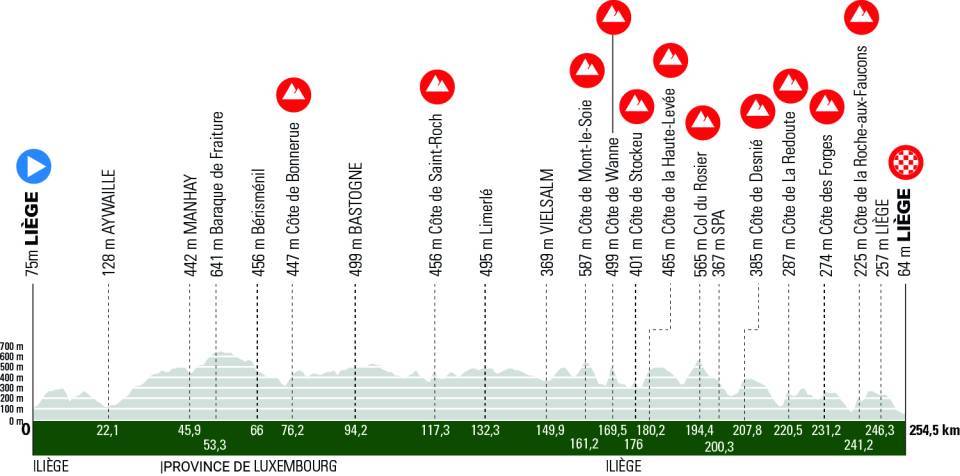
The Côte de la Redoute (1.6km, 8.8%) is Liège’s most revered climb, and in the past two editions has been the launchpad for Remco Evenepoel’s two escapes to victory. It’s not always been so decisive down the years, and the Côte des Forges (1.3km, 7.8%) and, in particular, the Côte de la Roche-aux-Faucons (1.3km, 11%) on this particular route also offer opportunities to launch decisive attacks of a group remains together.
That final climb tops out with still more than 13km to go to the line and, unlike the old route which finished on an uncategorised uphill to the line in Ans, there is nothing but downhill and flat main roads to the finish in the centre of Liège. That means any group that remains together after the Roche-aux-Faucons will inevitably decide the race in a reduced sprint, as was the case when Roglič won in 2020 and Pogačar won in 2021.
Contenders
Tadej Pogačar
There is little question that Tadej Pogačar (UAE Team Emirates) is the outright favourite to win this year’s Liège-Bastogne-Liège. The Slovenian has looked more powerful, more ruthless than ever this year in quest for victories, decimating the field in Strade Bianche and the Volta a Catalunya, as well as claiming a podium in one of his least-suited Classics, Milan-Sanremo.
There’s a sense of unfinished business here for Pogačar, despite having won the race previously, after he crashed out last year and was denied an elusive Ardennes hat-trick. This year’s build-up has been quite different to then, with a lot fewer race days and much more time at altitude training in preparation for the Giro d’Italia and then the Tour de France.
His opponents may hope that means he comes in slightly undercooked compared to those who have been battling through the Classics already, but Pogačar has rarely shown signs of rustiness after a break from racing.
The 25-year-old loves Classics racing, the attacking all-or-nothing approach much more suited to his style, and Liège, along with Il Lombardia, compliments his main strengths. His absorption of fatigue and his powerful punch up steep ramps after a long day of racing means few riders will be able to follow Pogačar in an all-out move. But even if they can, they may still struggle to match him in a final sprint for the line.
Mathieu van der Poel
One man who might fancy his chances in a reduced sprint is Mathieu van der Poel (Alpecin-Deceuninck). After all, the world champion has beaten Pogačar in previous sprints at the likes of the Tour of Flanders, Milan-Sanremo, and the E3 Saxo Classic. The main issue for Van der Poel is potentially remaining with Pogačar over the final climbs of the race.
He’s come close before in his one appearance at Liège in 2020, finishing sixth at just 14 seconds behind the likes of Roglič, Pogačar, and Julian Alaphilippe. And undoubtedly, the Mathieu van der Poel of this year is superior to that of 2020.
It’s been an incredible run of form for the 29-year-old since making his season debut at Milan-Sanremo, winning the E3 Saxo Classic, Tour of Flanders, and Paris-Roubaix, as well as second at Gent-Wevelgem.
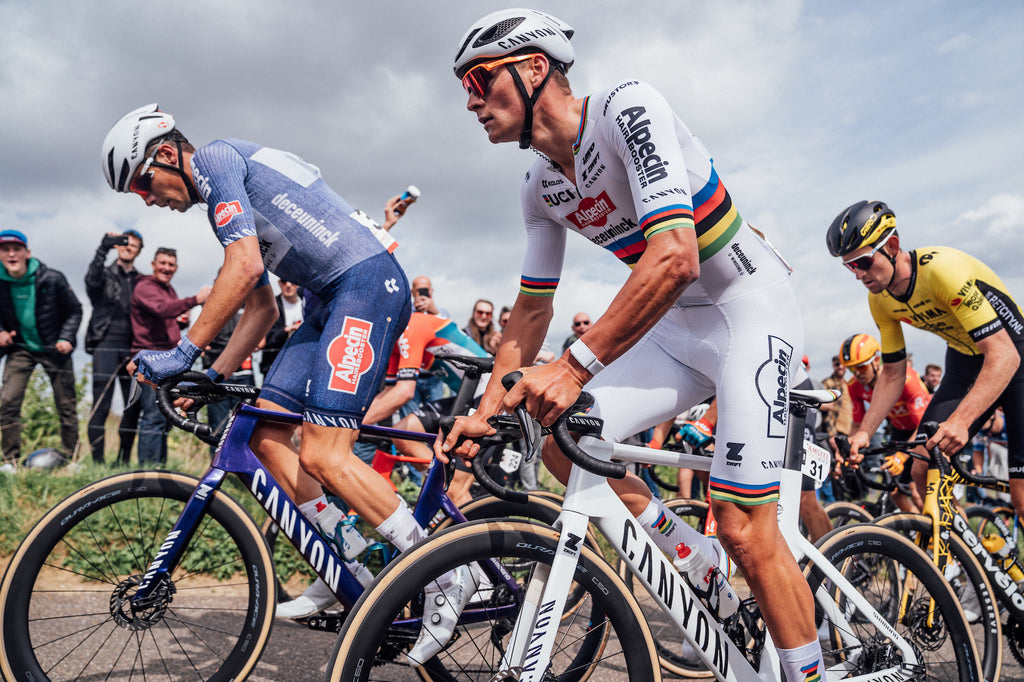
His three victories were executed with sensational dominance, but the first signs of wavering from that supremacy appeared at Amstel Gold Race last Sunday, where he remained unusually quiet as he remained in the wheels of the main peloton until the very end.
Was there a sense of withholding in preparation for the greater demands of Liège? We’ll never know for sure, but Van der Poel is unquestionably equipped to repeat his previous performances of this year at Liège. There might just be Tadej Pogačar who stands in his way.
Tom Pidcock
A rider happy to capitalise on a quiet day for Van der Poel last weekend was Britain’s Tom Pidcock (Ineos Grenadiers), who finally claimed an Ardennes Classic after sprinting to victory from the breakaway at Amstel Gold Race.
The 24-year-old has never quite tied a string of victories together as the likes of Pogačar or Van der Poel have, but he’s shown on numerous occasions his ability to dominate (Alpe d’Huez 2022, Strade Bianche 2023), as well as a wiliness to win from trickier head-to-head situations (Brabantse Pijl 2021, Amstel Gold 2024). He’s also proven himself more than capable at Liège, finishing second last year, albeit over a minute behind Evenepoel.
Pidcock’s form is clearly as good as ever (a DNF in Flèche Wallonne was more a symptom of the incredibly arduous conditions), and getting away earlier than expected at Liège could provide a front-foot strategy to taking Pogačar and Van der Poel out of the picture. He may not be able to quite match up to them at their very best, but there’s enough opportunity here to make the podium again or claim an unexpected first Monument victory.
Marc Hirschi
There was a point in time, 2020 to be precise, when you could have imagined Marc Hirschi (UAE Team Emirates) growing to be one of the strongest of Ardennes Classics contenders. A stage win in his debut Tour de France, third at the World Championships road race, a win at Flèche Wallonne, and second in Liège were all indicative of a rider who could assuredly show his talent given the right type of terrain.
That may still be true, being still only 25, but a recent mixture of injury and inconsistency has meant you never really know which Marc Hirschi is going to turn up. In recent weeks, his form has looked to regain a bit more consistency, particularly in hilly one-day races, having won the Faun Drôme Classic, taken third in Milano-Torino, and second at Amstel Gold Race last week.
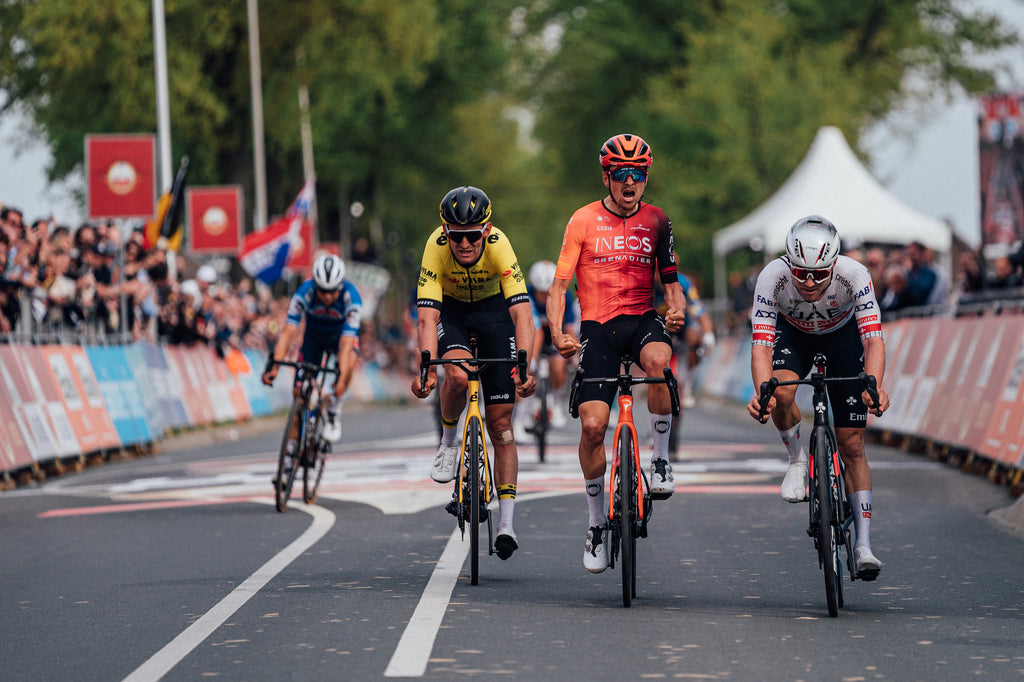
It’s that form and a history of performing well that make him a potential contender at Liège this weekend. The Swiss has ridden La Doyenne five times in his career and, aside from a 51st place on his debut, has never finished outside the top-10.
Hirschi may be charged with supporting team-mate Pogačar as the primary goal, but as we’ve seen in recent Classics, having a team-mate as a foil can pay dividends in overcoming tough opponents.
Maxim Van Gils
The Classics can often turn up unexpected names in the top 10 of results due to their unpredictable nature, but remaining consistently in that section of the results demonstrates a rider has the strength and understanding of how to position themselves in these races.
One rider quietly making a name for himself in one-day races is Belgian Maxim Van Gils (Lotto-Dstny), who so far this year has finished outside of the top-10 only once in the seven one-day races he’s ridden, including impressive third-place finishes at Strade Bianche and Flèche Wallonne, and for a climber, a canny seventh place at Milan-Sanremo.
A win for Van Gils feels like an outside shot given present company, but at just 24 a first Monument podium finish is very much on the cards and a major step towards what looks to be a promising career in the Ardennes Classics.
Other contenders
Such is the calibre of Liège-Bastogne-Liège, it can draw out a lot of riders to appear who may not normally bother turning up to other spring Classics. Simon Yates (Jayco-Alula) is one such rider, but the Briton’s form is a complete unknown given he hasn’t raced since a quiet Volta a Catalunya in March. Michael Matthews looks like a better option for the Australian team as he continues the hunt for a first major Classics win, but he has struggled to match a fourth-place finish on the old Liège finish in 2017.
Lidl-Trek look like a team with excellent options with the likes of Bauke Mollema and Toms Skujiņš, as well as Tao Geoghegan Hart, who will drop into the team for a one-off appearance at the Classics. However, Matthis Skjelmose would look their strongest bet, having placed ninth last year and looked strong at Paris-Nice and Itzulia Basque Country earlier this year.
Israel-Premier Tech bring Flèche Wallonne winner Stevie Williams as a possible outsider, though the Welshman has shown little propensity for the longer Classics so far in his young career. Dylan Theuns will also ride, with the Belgian looking close to his best again after finishing eighth at Tour of Flanders and runner-up at Brabantse Pijl.
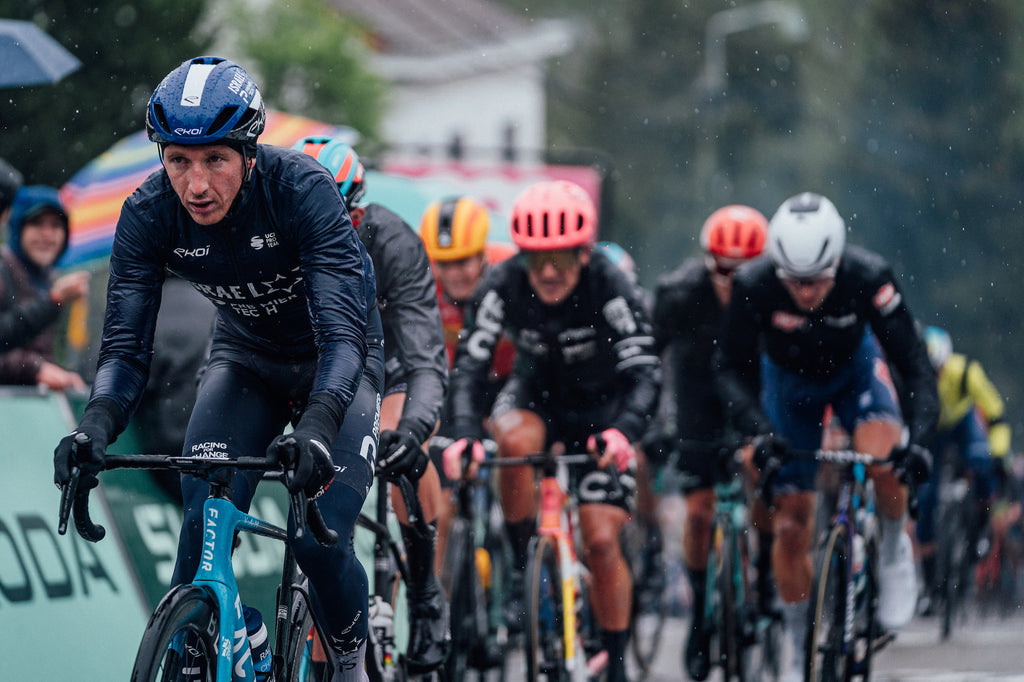
The man who beat him at Brabantse Pijl was Frenchman Benoît Cosnefroy, whose form certainly warrants the full-backing of his Decathlon AG2R La Mondiale team. There’s little evidence on his palmarès that Cosnefroy thrives in the very longest and hardest Classics, but there’s potential there, particularly if he can make it into a small escape group.
Elsewhere, Bahrain-Victorious bring a former winner in Wout Poels and a previous top-10 finisher in Matej Mohorič, while Tiesj Benoot will lead the line for Visma-Lease a Bike.
EF Education-EasyPost look like a strong team on paper, though Richard Carapaz appears to be gradually building into better form as we approach the Grand Tour season, while last year’s Ardennes revelation Ben Healy does not look on quite the same form, though is more than capable over this terrain.
Prediction
It’s hard to look past the imperious Tadej Pogačar for victory at Liège-Bastogne-Liège, particularly with the missing Remco Evenepoel and Primož Roglič. While Van der Poel will undoubtedly provide a challenge, we think Pogačar will prove too strong on the relentless hills of the Ardennes.






























